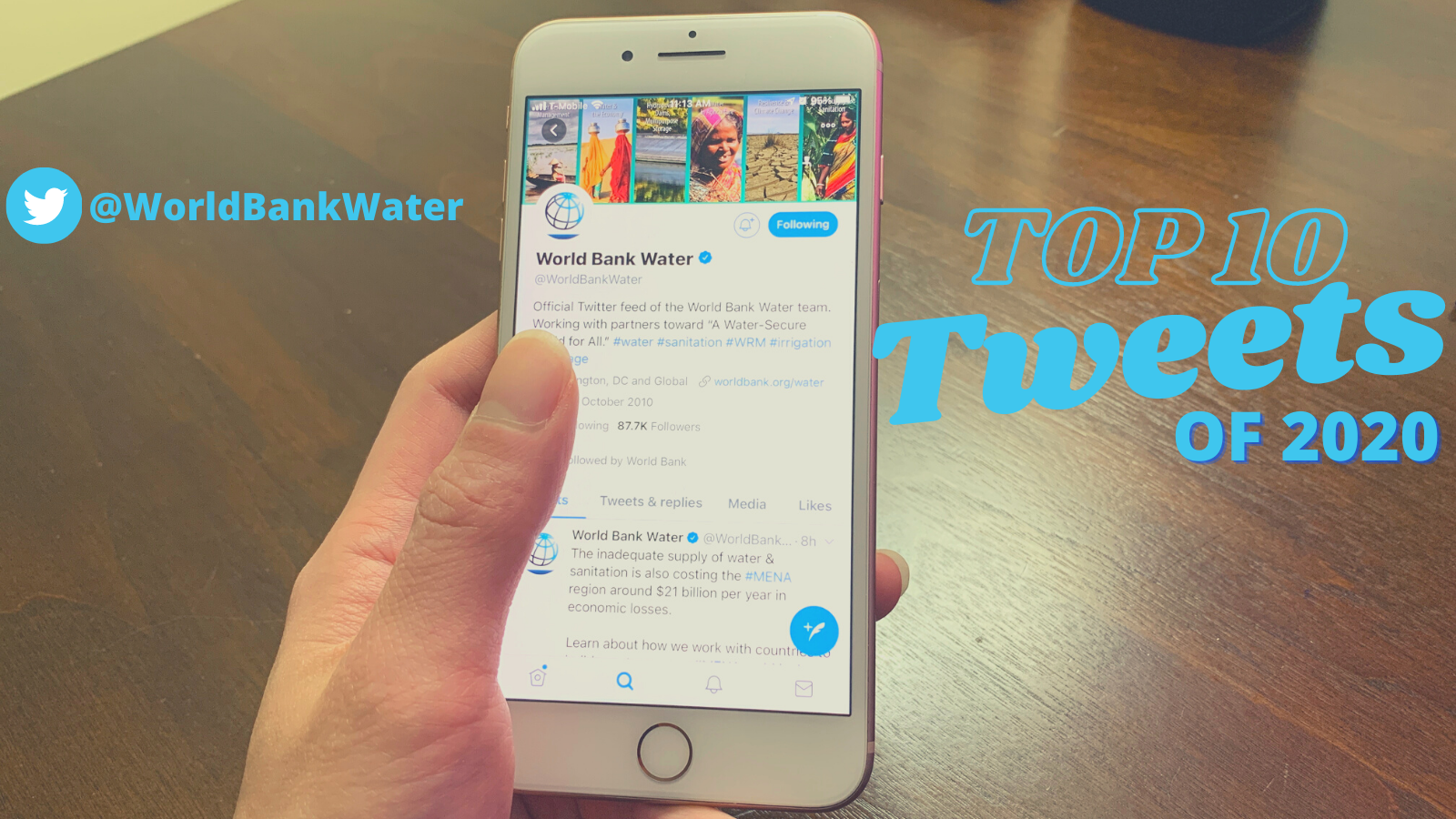 @WorldBankWater
@WorldBankWater
With COVID-19 dominating headlines throughout 2020 and affecting nearly every aspect of our lives, it’s no surprise that the pandemic was a prevailing theme that resonates with the followers of @WorldBankWater. The global health crisis has shaken the water sector and exposed the continued neglect of our water infrastructure and the gaps in access to water and sanitation services.
As we look back at the tweets that got
Here are the top 10 tweets of 2020 from @WorldBankWater:
Kicking off our list is the central message from our flagship report released to mark World Water Day 2020 – Wastewater: From Waste to Resource.
Safely managed water & sanitation services are essential in protecting human health during infectious disease outbreaks, including the current COVID-19 pandemic.
— World Bank Water (@WorldBankWater) March 21, 2020
A circular economy approach can help bridge the funding gap: https://t.co/teNYVc4up6#Waste2Resource #WorldWaterDay pic.twitter.com/E52tRybaJF
Over 500 million women and girls around the world lack adequate facilities for menstrual hygiene management (MHM), and the coronavirus pandemic has further exacerbated the menstruation-related challenges that many of them face. Investing in menstrual health and hygiene has been a fundamental part of the Bank’s WASH
The #COVID19 pandemic highlights & further exacerbates the menstruation-related challenges many women & girls face around the world.#ItsTimeforAction #MHDay2020
— World Bank Water (@WorldBankWater) May 28, 2020
Here is a video message by @Mari_Pangestu, @WorldBank
Managing Director of Development Policy and Partnerships pic.twitter.com/ZpTy4d6zEe
World Toilet Day is a United Nations Observance that celebrates toilets and raises awareness of the 4.2 billion people living without access to safely managed sanitation. It is about taking action to tackle the global sanitation crisis and achieve Sustainable Development Goal 6: water and sanitation for all by 2030.
Wastewater and sludge from toilets contain valuable water, nutrients and energy. Sustainable sanitation systems make productive use of waste to safely boost agriculture and also reduce and capture emissions for greener energy.#WorldToiletDay pic.twitter.com/xylveXvSCq
— World Bank Water (@WorldBankWater) November 9, 2020
By 2050, over half of the world’s population is projected to live in water-scarce regions. Finding solutions to the global water crisis is a priority for the @WorldBankWater community, and wastewater may provide the key.
?️36% of the world’s pop. live in water-scarce regions
— World Bank Water (@WorldBankWater) April 14, 2020
?By 2050 over half of the world’s pop. will be at risk due to water stress
? Wastewater treatment & reuse is key to a sustainable future.
REPORT: https://t.co/KWP1xvv07Y#waste2resource #WorldWaterDay pic.twitter.com/4QivHoYJix
World Water Week, the leading event on global water issues held each year in Stockholm, transformed in 2020 to “World Water Week At Home,” a virtual conference that allowed people to safely meet, despite the COVID-19 pandemic. The World Bank convened and participated in 20 sessions, collaborating with partners to find solutions to pressing water-related challenges.
Sustainable WASH systems rely on coordination and cooperation of financial and technical elements.
— World Bank Water (@WorldBankWater) August 20, 2020
Join us at #WWWeek to as we track down and learn from successful cases→ https://t.co/m5SHEnD9Oy@giz_gmbh @IRCWASH @sanwatforall @AFD_France pic.twitter.com/bCcFL21AeD
Citywide Inclusive Sanitation (CWIS) aims to shift the urban sanitation paradigm to focus on the whole sanitation service chain and access for all, especially the poor. Together with other key partners, the World Bank has been at the forefront of the growing CWIS movement. In the last few years, our
2.4 billion people live without access to basic sanitation services.
— World Bank Water (@WorldBankWater) November 15, 2020
4.5 billion people lack access to safely managed sanitation.
It's time to address this global crisis.
Download resources & learn more at our #InclusiveSanitation hub: https://t.co/UZi8Ql7bau#WorldToiletDay pic.twitter.com/fqYYg9Eyk9
On #WorldToiletDay, the Citywide Inclusive Sanitation (CWIS) team at the World Bank Water Global Practice released a new guide, Connecting the Unconnected, that looks at the reasons why so many households still get left behind and remain unconnected to existing or new sewer networks
Globally, only 45% of the population uses a safely managed sanitation service.
— World Bank Water (@WorldBankWater) November 19, 2020
How can we maximize household connections to sewers & make sure no one gets left behind?
⚡NEW REPORT⚡⇨ https://t.co/AjCtXhTz96#WorldToiletDay#InclusiveSanitation#ConnectTheUnconnected pic.twitter.com/1Rdmw793wy
As COVID-19 began spreading rapidly across continents in early 2020, it was important to advocate for measures to help protect people from the virus. The Bank supported Haiti in launching a large-scale public awareness campaign, which promoted the use of face masks, physical distancing and good handwashing behavior. This animated video, just one example from the campaign, resonated with our followers, and hopefully, helped encourage safe behaviors in Haiti and beyond.
How many times did you #WashYourHands properly today?#Handwashing w/soap is one of the most effective ways to #stopthespread of the #COVID19 coronavirus.
— World Bank Water (@WorldBankWater) July 31, 2020
Learn more about actions you can take to keep yourself & others healthy:https://t.co/4Go0qwjMsL pic.twitter.com/arLJVCR26Q
Agriculture is the lifeblood of Uganda’s economy. Irrigation can support Ugandan farmers
Under #Uganda’s National Irrigation Strategy, the country plans to irrigate 1.5 million hectares of land within the next two decades.
— World Bank Water (@WorldBankWater) September 17, 2020
The @WorldBank-supported Micro-Scale Irrigation Program is helping to make that vision a reality: https://t.co/UXAdrEri8b#UGirrigation pic.twitter.com/GyV62LMQMr
Rounding out our list of the year’s top tweets is a stark reminder that one of the most effective ways to stop the spread of a virus is also one of the simplest: handwashing with soap and water. On Global Handwashing Day, our Twitter followers showed appreciation for the seven World Bank Vice Presidents and two Global Directors who stepped forward to advocate for increased investments in hand hygiene for all.
Everyone deserves ?water, ?handwashing facilities & ?soap.
— World Bank Water (@WorldBankWater) October 19, 2020
Join @HafezGhanem_WB @ousmane_diagana @Victoriakwakwa @MamtaMurthi @SandieOkoro @HartwigSchafer , Juergen Voegele, @muhammadpate @JenniferJSara1 ,
to advocate for #HandHygieneforAll.https://t.co/4fj1JV2XHO pic.twitter.com/KKUz9wrZ0k
In a year like no other in recent history, 2020 presented enormous challenges to the water and sanitation sector. How governments, utilities, and industries respond to the crisis will likely shape the future of WASH. Our Twitter community makes us optimistic about that future, and we thank all of you for consistently bringing thoughtful, compelling, and action-oriented discussions to the platform as we strive to build resilient, sustainable and inclusive WASH systems around the world. We look forward to continuing the conversation in 2021.



Join the Conversation